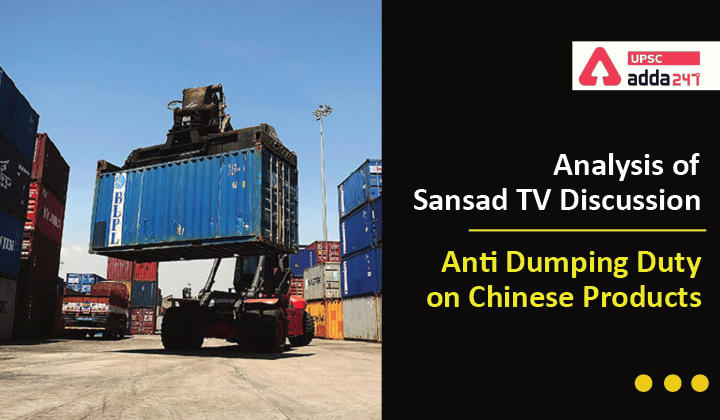Table of Contents
Context
- The Central Board of Indirect Taxes and Customs (CBIC) recently notified the imposition of anti-dumping duty on five products manufactured in China.
- This step is taken in order to safeguard domestic producers from lower-priced imports that the Directorate General of Trade Remedies (DGTR) had found as being ‘dumped’ in the Indian market.
Background
- In almost all the five products, the Commerce Ministry agency initiated its anti-dumping investigations in September 2020 and reached its final findings about 12 months later.
- CBIC’s imposition of the anti-dumping levy for five years on these Chinese products is based on the DGTR’s findings that their import constituted ‘dumping’, which was causing injury to local producers, and an ensuing recommendation that a protective duty was warranted.
Which Items Included?
India has imposed anti-dumping duties on five Chinese products, including certain aluminium goods and some chemicals(including a component of the refrigerant hydrofluorocarbon), for five years to guard local manufacturers from cheap imports from the neighbouring country.
A weapon authorised by WTO
- Anti Dumping Duty is a remedy sanctioned by the WTO to protect a member country’s domestic industry from imports that have been priced at levels below those prevailing in the exporting nation’s home market, the anti-dumping duty has become one of India’s most widely used trade weapons, especially against a flood of cheaper Chinese imports.
- As of February 2020, India had imposed anti-dumping measures on 90 Chinese products, with another 24 China-specific anti-dumping investigations in progress at the time, according to a reply made in Parliament by Commerce Minister Piyush Goyal.
About Anti Dumping Duties
- Countries initiate anti-dumping probes to determine if the domestic industry has been hurt by a surge in below-cost imports. As a counter-measure, they impose duties under the multilateral WTO regime.
- Anti-dumping measures are taken to ensure fair trade and provide a level-playing field to the domestic industry. Both India and China are members of the Geneva-based World Trade Organisation (WTO).
- India has initiated maximum anti-dumping cases against dumped imports from China.
- India’s exports to China during the April-September 2021 period were worth USD 12.26 billion while imports aggregated at USD 42.33 billion, leaving a trade deficit of USD 30.07 billion.
Is it always justifiable to use Anti Dumping Duty as a remedy?
- A reflexive resort to the anti-dumping duty, especially if the domestic applicant is a significantly large and relatively resilient manufacturer of the product, risks skewing the market dynamics in the Indian company’s favour, with both downstream industries, in the case of intermediate goods, and consumers likely to face the consequences of reduced competition on final prices.
- Also, efforts to narrow the sizeable trade deficit with China by targeted recourse to the levy have made little headway in addressing the widening gap as imports have continued to largely outpace India’s exports.
The effectiveness of the measure in providing timely relief to smaller domestic manufacturers facing an existential crisis on account of suspected dumping has also been undermined in the past by a less than ‘swift’ process with the DGTR hamstrung by personnel crunch. - With companies worldwide now seeking to de-risk their businesses from excessive reliance on China in the wake of the COVID-19 pandemic, the prospect of more capacity in that country turning surplus and being used to produce goods for dumping overseas increases. Indian policymakers have their task cut out to bolster trade defences in time.
The procedure of Imposing an Anti Dumping Duty
- While DGTR(commerce ministry’s investigation arm) recommends the duty to be levied, the finance ministry imposes it.
- In the case of China, DGTR in separate probes has concluded that these products have been exported at a price below normal value in Indian markets, which has resulted in dumping.
- According to DGTR, the domestic industry has suffered material injury due to the dumping.
- “The anti-dumping duty imposed under this notification (on Silicone Sealant ) shall be levied for a period of five years (unless revoked, superseded or amended earlier) from the date of publication of this notification in the Official Gazette and shall be payable in Indian currency.
- The CBIC has also imposed the duty on a vehicle component – Axle for Trailers in CKD/SKD (complete and semi-knocked down) to protect domestic makers from cheap Chinese imports.
- Similarly, it has also slapped the duty on imports of calcined gypsum powder from Iran, Oman, Saudi Arabia and the United Arab Emirates (UAE) for five years.



 TSPSC Group 1 Question Paper 2024, Downl...
TSPSC Group 1 Question Paper 2024, Downl...
 TSPSC Group 1 Answer key 2024 Out, Downl...
TSPSC Group 1 Answer key 2024 Out, Downl...
 UPSC Prelims 2024 Question Paper, Downlo...
UPSC Prelims 2024 Question Paper, Downlo...
